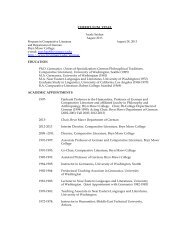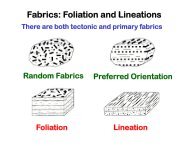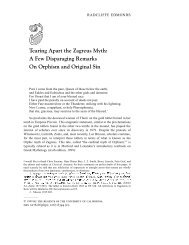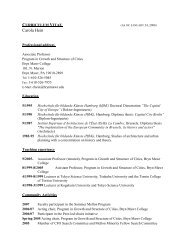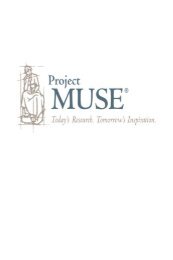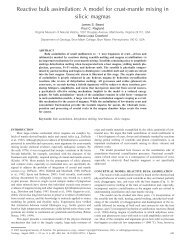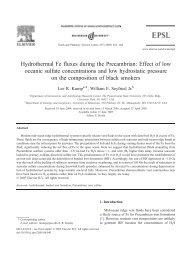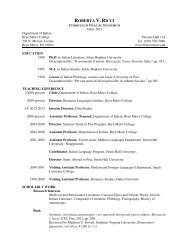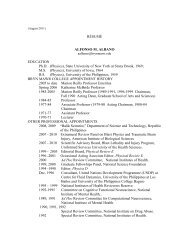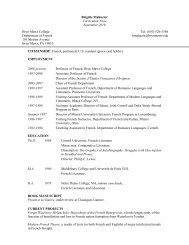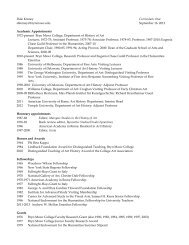- Page 1:
Middle and Late Bronze Age Metal To
- Page 4 and 5:
investigation of the carpentry/maso
- Page 6 and 7:
Volume 1 CHAPTER 1: TABLE OF CONTEN
- Page 8 and 9:
Sites from the Greek islands 202 Si
- Page 10 and 11:
LIST OF TABLES Table 4.1: Shaft-hol
- Page 12 and 13:
Figure 3.12: Distribution of metall
- Page 14 and 15:
Figure 4.28: Map showing MBA carpen
- Page 16 and 17:
Plate 4.33: Double adze from Enkomi
- Page 18 and 19:
Plate 5.29: Orchomenos tool kit, Ch
- Page 20 and 21:
Several fellowships provided financ
- Page 22 and 23:
administrative staff at the college
- Page 24 and 25:
MBA 2000- 1600 LBA 1600- 1050 CHRON
- Page 26 and 27:
in the Aegean. 2 Small copper imple
- Page 28 and 29:
een easier with metal tools than st
- Page 30 and 31:
extremely scarce and the dearth of
- Page 32 and 33:
extraordinary number of metal tools
- Page 34 and 35:
this observation is astonishing sin
- Page 36 and 37:
Danube (IVe au IIe millénaire). Wh
- Page 38 and 39:
Mycenaean tool repertoire, yet some
- Page 40 and 41:
Chapter 2: Avenues for metallurgica
- Page 42 and 43: cited as evidence for metallurgical
- Page 44 and 45: ecycled items. Final products like
- Page 46 and 47: ich published dataset, only a few s
- Page 48 and 49: Quantities of raw metal were widely
- Page 50 and 51: Turkey. Upon touring these sites, i
- Page 52 and 53: The method for interpreting data fr
- Page 54 and 55: second millennium BC. Such cases ar
- Page 56 and 57: study area (from Cyprus), and its i
- Page 58 and 59: are sufficiently differentiated fro
- Page 60 and 61: his reconsideration of third millen
- Page 62 and 63: to Catling, a violent purpose for t
- Page 64 and 65: Different tool names may imply diss
- Page 66 and 67: chisels. Categories 2 and 4 occur f
- Page 68 and 69: detail for the carpentry/masonry to
- Page 70 and 71: Isthmia region throughout the histo
- Page 72 and 73: Gender responsibilities are investi
- Page 74 and 75: Chapter 3: Metal tools in the secon
- Page 76 and 77: double adze from the Enkomi Gunnis
- Page 78 and 79: The link between a craftsperson and
- Page 80 and 81: specialized and intended for specif
- Page 82 and 83: III: The relationship of stone, bon
- Page 84 and 85: durability. Stone cutting objects b
- Page 86 and 87: information together. In the Aegean
- Page 88 and 89: In addition to greater amounts of t
- Page 90 and 91: y region may reflect social and cra
- Page 94 and 95: accurately account for the internal
- Page 96 and 97: given to stockpiled tools. Thirty-f
- Page 98 and 99: the larger and stronger metal types
- Page 100 and 101: hoes/plowshares were preferred in b
- Page 102 and 103: ather than a shipwreck. 165 Yet, li
- Page 104 and 105: ideograms. 173 The Linear B ideogra
- Page 106 and 107: The relative absence of Aegean digg
- Page 108 and 109: goods were redistributed in two dis
- Page 110 and 111: Bronze Age Mediterranean climate is
- Page 112 and 113: frequency of these tools, however,
- Page 114 and 115: mandated a striking implement. Wood
- Page 116 and 117: patterns occur despite the fact tha
- Page 118 and 119: is even more striking when compared
- Page 120 and 121: quantities, actual smiths are menti
- Page 122 and 123: The presence of metallurgical tools
- Page 124 and 125: metal smiths moved throughout the l
- Page 126 and 127: Site size and contextual analysis s
- Page 128 and 129: is significant, as both regions wer
- Page 130 and 131: the prominent LBA object type (53.6
- Page 132 and 133: cannot always aid functional interp
- Page 134 and 135: due in large part to 1) palatial li
- Page 136 and 137: punches, borers, undefined implemen
- Page 138 and 139: include bandages, pack-saddles, rei
- Page 140 and 141: egion. The proportions of carpentry
- Page 142 and 143:
instruments during the course of th
- Page 144 and 145:
Cretan patterns (Fig. 3.31a): The r
- Page 146 and 147:
Despite the greater tool diversity,
- Page 148 and 149:
Syria-Palestine. The status of the
- Page 150 and 151:
distribution, as the category is qu
- Page 152 and 153:
differences in the consumption of t
- Page 154 and 155:
comparable to modern rulers and tap
- Page 156 and 157:
probably influenced from the east,
- Page 158 and 159:
Palestine and Anatolia. There are n
- Page 160 and 161:
4.2). 316 Similar blades are known
- Page 162 and 163:
part of a metal hoard that was stas
- Page 164 and 165:
Whether the double ax was an implem
- Page 166 and 167:
few select palaces (e.g. Mycenae, A
- Page 168 and 169:
specimens (Evely’s Type 4 lists s
- Page 170 and 171:
conveys how chisels, single axes, s
- Page 172 and 173:
functional differences. An implemen
- Page 174 and 175:
The tool type is common in Anatolia
- Page 176 and 177:
their size alone (Fig. 4.4), and th
- Page 178 and 179:
mortuary contexts, thus confirming
- Page 180 and 181:
were incorporated into double-ended
- Page 182 and 183:
Phornou Korifi, Myrtos, and Ayia Ph
- Page 184 and 185:
Size 1 (0.5 cm or less) Size 2 (0.6
- Page 186 and 187:
carving out deep mortises in wooden
- Page 188 and 189:
Mycenaean and Cypriot contexts, whi
- Page 190 and 191:
the socket may be that a wooden sha
- Page 192 and 193:
worn and battered from use; this da
- Page 194 and 195:
the early 12 th century: “It may
- Page 196 and 197:
Syria-Palestine 2 - 2 - Shipwrecks
- Page 198 and 199:
of shafted double hammers is also f
- Page 200 and 201:
in the Brunnen 212 hoard was conver
- Page 202 and 203:
mainland and may have aided drillin
- Page 204 and 205:
The tubular drill was first devised
- Page 206 and 207:
siderópetra (hard limestone known
- Page 208 and 209:
egularly considered to be absent fr
- Page 210 and 211:
together two sides of a handle, a f
- Page 212 and 213:
implement, it was employed from tim
- Page 214 and 215:
70 percent of the catalogue (79 out
- Page 216 and 217:
3. Saws with a straight blade top a
- Page 218 and 219:
ounded tip end with teeth (Plate 4.
- Page 220 and 221:
consumer. Cretan carpentry/masonry
- Page 222 and 223:
and Knossos, seemingly reflecting t
- Page 224 and 225:
Ayia Marina 1 1 chisel Gona (Macedo
- Page 226 and 227:
Ithaka-Polis 3 - 3 - 1 single/flat
- Page 228 and 229:
are reported from Ayia Irini, altho
- Page 230 and 231:
the island in the MBA. The distribu
- Page 232 and 233:
MBA site Total carpentry - masonry
- Page 234 and 235:
eported here. Despite this caveat,
- Page 236 and 237:
MBA site Total carpentry - masonry
- Page 238 and 239:
4.21). Minoan double axes and saws
- Page 240 and 241:
diameters are 5 cm and greater) mus
- Page 242 and 243:
(like Minoan types) as opposed to t
- Page 244 and 245:
Although traces of Anatolian or Ana
- Page 246 and 247:
common to Crete and Cyprus. The sin
- Page 248 and 249:
double ax forms, implies that the c
- Page 250 and 251:
carpentry/masonry tools contribute
- Page 252 and 253:
organized.” 530 My assertion rega
- Page 254 and 255:
type of diversity that may mark a t
- Page 256 and 257:
of fragmentation practices restrict
- Page 258 and 259:
final stage of the metal working: t
- Page 260 and 261:
shaped razor. 545 A similar collect
- Page 262 and 263:
workshops were easier to identify i
- Page 264 and 265:
definition of a hoard as “a group
- Page 266 and 267:
some hoards contained thousands of
- Page 268 and 269:
Discerning founders’ hoards from
- Page 270 and 271:
most assemblages were destined for
- Page 272 and 273:
often selected according to certain
- Page 274 and 275:
economic approach to hoarding must
- Page 276 and 277:
lacks contextual information or chr
- Page 278 and 279:
of objects from Mochlos also produc
- Page 280 and 281:
unrelated objects; and 3) the tradi
- Page 282 and 283:
as rare. Only two Cretan hoards con
- Page 284 and 285:
of comparison, there are 87 double
- Page 286 and 287:
data coded in this manner, it becam
- Page 288 and 289:
The similarity of the Tiryns hoard
- Page 290 and 291:
axes, and drills. Awls/engravers an
- Page 292 and 293:
functional interpretation of that a
- Page 294 and 295:
e-casting metal, which required hot
- Page 296 and 297:
524) has shaft-hole sidewalls of di
- Page 298 and 299:
were consciously formed and likely
- Page 300 and 301:
saws, ax-adzes, a broad chisel, dou
- Page 302 and 303:
oxhide ingot fragments and metallur
- Page 304 and 305:
metallurgical and agricultural tool
- Page 306 and 307:
Tsountas (Mycenae), Kalydon-Psoroli
- Page 308 and 309:
Carpentry or masonry utensils repre
- Page 310 and 311:
stone-working tools included sixtee
- Page 312 and 313:
tools. One has a wide, deformed ham
- Page 314 and 315:
tool kit). Diversity is a hallmark
- Page 316 and 317:
V. The metal objects from shipwreck
- Page 318 and 319:
Tool or object Uluburun (total 65+)
- Page 320 and 321:
occurrence is a definite sign of a
- Page 322 and 323:
implements in one context comes fro
- Page 324 and 325:
Foundry and Sinda hoards, but other
- Page 326 and 327:
tool distribution patterns in hoard
- Page 328 and 329:
only sporadically in burials and wo
- Page 330 and 331:
combination adze forms (double adze
- Page 332 and 333:
produced a monograph specifically o
- Page 334 and 335:
are currently in progress and will
- Page 336 and 337:
thriving metallurgical and craft in
- Page 338 and 339:
of Middle Cypriot tools, however, i
- Page 340 and 341:
number of utilitarian and small cra
- Page 342 and 343:
extremely limited in comparison to
- Page 344 and 345:
metallurgical operations are plenti
- Page 346 and 347:
absent. 758 The Linear B tablets at
- Page 348 and 349:
The Cypriot copper industry reached
- Page 350 and 351:
implements comprise 45% of the regi
- Page 352 and 353:
the preferences commonly found with
- Page 354 and 355:
possible that merchants, metal smit
- Page 356 and 357:
Syria-Palestine is not accidental,
- Page 358 and 359:
specifically adze variations (e.g.
- Page 360 and 361:
likelihood, these implements were u
- Page 362 and 363:
Two elongated chisels from Mycenae
- Page 364 and 365:
cutting edges wider than the object
- Page 366 and 367:
are collectively known from Crete a
- Page 368 and 369:
The distribution of shaft-hole axes
- Page 370 and 371:
this form are unknown in the Aegean
- Page 372 and 373:
artisans trained in a Minoan style?
- Page 374 and 375:
transfer of painted plaster moved f
- Page 376 and 377:
producing and consuming metal tools
- Page 378 and 379:
the Argolid acquired specialized Hi
- Page 380 and 381:
traveled from region to region prac
- Page 382 and 383:
A complete study of metal tools req
- Page 384 and 385:
Dissertation Bibliography Agouridis
- Page 386 and 387:
BC, edited by A. B. Knapp. Altamont
- Page 388 and 389:
Austin: Université de Liège; Univ
- Page 390 and 391:
Calder, W. M., and D. A. Traill, ed
- Page 392 and 393:
Cline, E., and A. Yasur-Landau. 200
- Page 394 and 395:
des maisons et quartiers d'habitati
- Page 396 and 397:
Ellis, R. S. 1968. Foundation Depos
- Page 398 and 399:
Gale, N. H., and Z. A. Stos-Gale. 1
- Page 400 and 401:
Laffineur and P. P. Betancourt. Li
- Page 402 and 403:
Homerica, edited by H.-G. Buchholz
- Page 404 and 405:
Marinatos. Stockholm: Svenska Insti
- Page 406 and 407:
———. 2004. Wheat, Barley, Flo
- Page 408 and 409:
London, G. A. 2002. Women Potters a
- Page 410 and 411:
33: 61-87. Moran, W. L., ed. 1992.
- Page 412 and 413:
Nebelsick, L. 2000. Rent Asunder: R
- Page 414 and 415:
Oldest Capital City of the Hittites
- Page 416 and 417:
Poursat, J.-C. 1978. Travaux de L'
- Page 418 and 419:
Ruscillo, D. 2006. Catalogue of Mis
- Page 420 and 421:
———. 2006a. Catalogue of Misc
- Page 422 and 423:
Stewart, J. 1961. The Early Bronze
- Page 424 and 425:
Metallurgy in the Bronze Age. Proce
- Page 426 and 427:
Walberg, G. 1998. Excavations on th
- Page 428 and 429:
Seventh International Symposium at
- Page 430 and 431:
Volume 2 APPENDIX 1: Figures (diagr
- Page 432 and 433:
Total quantity 2000 1500 1000 500 0
- Page 434 and 435:
Carpentry/ masonry 2253 (42.4%) Fig
- Page 436 and 437:
Figure 3.5b - Agricultural tools: q
- Page 438 and 439:
Figure 3.9d - Cyprus LBA quantities
- Page 440 and 441:
Medium, 67 Figure 3.11 - Distributi
- Page 442 and 443:
Billet = 1 Mold = 1 Wedge, socketed
- Page 444 and 445:
Percentage 80 70 60 50 40 30 20 10
- Page 446 and 447:
Quantity Quantity 1400 1200 1000 80
- Page 448 and 449:
2 nd mill. (n=17) Spatula/scraper =
- Page 450 and 451:
General 2 nd millennium (n=20) Knif
- Page 452 and 453:
Total quantity 400 300 200 100 0 17
- Page 454 and 455:
Figure 3.26b: Carpentry/Masonry too
- Page 456 and 457:
Single/flat ax (n=370) 185 (40.7%)
- Page 458 and 459:
General 2 nd millennium (n=21) Sing
- Page 460 and 461:
General 2 nd millennium (n=89) Shaf
- Page 462 and 463:
Figure 4.1: Shaft-hole axes: region
- Page 464 and 465:
Figure 4.2: Doubles axes: regional
- Page 466 and 467:
Cutting edge width (cm) 12 10 8 6 4
- Page 468 and 469:
Tool series N Mean of ratio Standar
- Page 470 and 471:
Figure 4.7: Single/flat axes: regio
- Page 472 and 473:
Cutting edge width (cm) 8 7 6 5 4 3
- Page 474 and 475:
Figure 4.10: Chisels: Scatter plots
- Page 476 and 477:
Cutting edge width (cm) 7 6 5 4 3 2
- Page 478 and 479:
Chisels by size Number Ratio Mean S
- Page 480 and 481:
Cutting edge width (cm) 3 2.5 2 1.5
- Page 482 and 483:
Figure 4.17: Ax-adzes: regions meas
- Page 484 and 485:
Figure 4.19: Hollow cylindrical met
- Page 486 and 487:
Figure 4.20 continued: Saw measurem
- Page 488 and 489:
G,1 (30) F3, (2) F2, (2) E2, (2) E1
- Page 490 and 491:
F3, (7) F2, (9) F1, (11) G1, (37) E
- Page 492 and 493:
F2, (2) F3, (1) G1, (4) E1, (27) E2
- Page 494 and 495:
1-5 6-15 16-30 31-50 51-100 100 + S
- Page 496 and 497:
Figure 5.1: Tool frequencies and di
- Page 498 and 499:
Figure 5.2 continued - Hoards from
- Page 500 and 501:
Figure 5.3 continued - Hoards from
- Page 502 and 503:
Hoards: 1 - 13 are from Crete 1: Sa
- Page 509 and 510:
40 51 19 38 34 45 48 33 36 46 28 29
- Page 511 and 512:
Proximity Matrix for the tool types
- Page 513 and 514:
Narrow chisel Flat/single ax Shaft-
- Page 515 and 516:
Plate 4.3: Shaft-hole ax from Cypru
- Page 517 and 518:
Plate 4.9: Andronianoi (Euboea) dou
- Page 519 and 520:
Plate 4.15 Single/flat ax from Kata
- Page 521 and 522:
Plate 4.22: Chisel of size 3; Enkom
- Page 523 and 524:
Plate 4.33: Double adze: from the G
- Page 525 and 526:
Plate 4.39: Trésor de Bronzes adze
- Page 527 and 528:
Plate 4.47: Saw type 3: Boğazköy-
- Page 529 and 530:
Plate 5.1: Katamachi hoard - Ioanni
- Page 531 and 532:
Plate 5.7: MX 541 - Double or singl
- Page 533 and 534:
Plate 5.13: Chisel fragment; MX 519
- Page 535 and 536:
Tsountas hoard, double axes 9 doubl
- Page 537 and 538:
Plate 5.23: Double ax fragment-Anth
- Page 539 and 540:
Plate 5.27: Enkomi Gunnis Hoard - (
- Page 541 and 542:
L: hammer-adze R: double adze fragm
- Page 543 and 544:
Appendix 3: Second Millennium BC Me
- Page 545 and 546:
Carpentry/masonry tools 1 total: 1
- Page 547 and 548:
Tool count and frequency 4 (14.3%)
- Page 549 and 550:
Other objects 2 awls, 1 large scrap
- Page 551 and 552:
Tool count and frequency 4 (44.4%)
- Page 553 and 554:
15 th -14 th century: LH II - IIIA1
- Page 555 and 556:
Other objects 1 bronze weight with
- Page 557 and 558:
Likelihood of hoard Definite 46. Gr
- Page 559 and 560:
Nicosia, Cyprus Museum (inv. Enkomi
- Page 561 and 562:
Bibliography Taylor 1957, 20, 86-90
- Page 563 and 564:
(…/1520.12,13,14,15); 18 castings
- Page 565 and 566:
cauldron fragments), 1 ingot fragme
- Page 567 and 568:
Other objects 45 sickles, 3 swords,
- Page 569 and 570:
Context and date of 46.3, 47.1-4 Pi
- Page 571 and 572:
Sites & Object types Specific date
- Page 573 and 574:
Sites & Object types Specific date
- Page 575 and 576:
Sites & Object types Specific date
- Page 577 and 578:
Sites & Object types Specific date
- Page 579 and 580:
Sites & Object types Specific date
- Page 581 and 582:
Sites & Object types Specific date
- Page 583 and 584:
Sites & Object types Specific date
- Page 585 and 586:
Sites & Object types Specific date
- Page 587 and 588:
Sites & Object types Specific date
- Page 589 and 590:
Sites & Object types Specific date
- Page 591 and 592:
Sites & Object types Specific date
- Page 593 and 594:
Sites & Object types Specific date
- Page 595 and 596:
Sites & Object types Specific objec
- Page 597 and 598:
Sites & Object types Specific objec
- Page 599 and 600:
Sites & Object types Specific objec
- Page 601 and 602:
Sites & Object types Specific objec
- Page 603 and 604:
Sites & Object types Lefkas: genera
- Page 605 and 606:
Sites & Object types Specific objec
- Page 607 and 608:
Sites & Object types Specific objec
- Page 609 and 610:
Sites & Object types Specific objec
- Page 611 and 612:
Sites & Object types Specific objec
- Page 613 and 614:
Sites & Object types Specific objec
- Page 615 and 616:
Sites & Object types Specific objec
- Page 617 and 618:
Sites & Object types Specific objec
- Page 619 and 620:
Sites & Object types Specific objec
- Page 621 and 622:
Sites & Object types Specific perio
- Page 623 and 624:
Sites & Object types Specific perio
- Page 625 and 626:
Sites & Object types Specific perio
- Page 627 and 628:
Sites & Object types Specific objec
- Page 629 and 630:
Sites & Object types Specific objec
- Page 631 and 632:
Sites & Object types Specific objec
- Page 633 and 634:
Sites & Object types Specific objec
- Page 635 and 636:
Sites & Object types Specific objec
- Page 637 and 638:
Sites & Object types Specific objec
- Page 639 and 640:
Sites & Object types Specific objec
- Page 641 and 642:
Sites & Object types Specific objec
- Page 643 and 644:
Sites & Object types Specific objec
- Page 645 and 646:
Sites & Object types Specific objec
- Page 647 and 648:
Sites & Object types Specific objec
- Page 649 and 650:
Sites & Object types Specific objec
- Page 651 and 652:
Sites & Object types Specific objec
- Page 653 and 654:
Sites & Object types Specific objec
- Page 655 and 656:
Sites & Object types Specific objec
- Page 657 and 658:
Sites & Object types Specific objec
- Page 659 and 660:
Sites & Object types Specific objec
- Page 661 and 662:
Sites & Object types Specific objec
- Page 663 and 664:
Sites & Object types Specific objec
- Page 665 and 666:
Sites & Object types Specific objec
- Page 667 and 668:
Sites & Object types Specific objec
- Page 669 and 670:
Sites & Object types Specific objec
- Page 671 and 672:
Sites & Object types Specific objec
- Page 673 and 674:
Sites & Object types Specific objec
- Page 675 and 676:
Sites & Object types Specific objec
- Page 677 and 678:
Sites & Object types Specific objec
- Page 679 and 680:
Sites & Object types Specific objec
- Page 681 and 682:
Sites & Object types Specific objec
- Page 683 and 684:
Sites & Object types Specific objec
- Page 685 and 686:
Sites & Object types Specific objec
- Page 687 and 688:
Sites & Object types Specific perio
- Page 689 and 690:
Sites & Object types Specific perio
- Page 691:
Sites & Object types Specific perio




